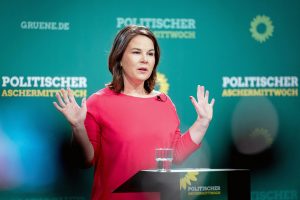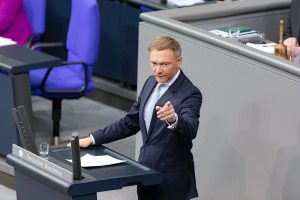Germany’s Greens and Free Democrats (FDP) are taking the lead in forming the next coalition government.
The two parties won a combined 120 seats in the election on Sunday, more than either the Social Democrats (SPD), who placed first, or the Union of Christian Democrats, who came in second. They would still need one of the two bigger parties for a majority. The Greens would prefer to team up with the SPD. The liberal FDP would prefer a coalition with the Union.
The best way to avoid gridlock is for the smaller parties to do a deal first and then see whether the SPD or Union could support it.
Here’s what such a deal might look like.
Budget and taxes
The Greens want to relax Germany’s debt break, which limits structural deficits to .35 percent of economic output, and raise taxes on businesses and high incomes. The FDP oppose debt and tax increases.
A compromise could raise Germany’s debt ceiling to 3 percent of economic output, which is the European treaty norm, and eliminate the highest income tax bracket.
Germany taxes income over €58,000 at 42 percent and income over €275,000 at 45 percent. Taxing all income over €58,000 at 45 percent would give the Greens plenty of money without hurting the middle class. Business taxes should remain unchanged.
Climate and energy
Both the Greens and FDP want to reduce greenhouse gas emissions to net zero by 2050.
The Greens have the most concrete plans, including phasing out coal power by 2030, using only renewables from 2035, building 1.5 million solar roofs in the next four years, raising the carbon price from €25 to €60 per tonne, banning the export of unrecyclable plastic waste and pushing for an EU-wide deposit return scheme for bottles and cans.
The carbon price shouldn’t be an issue. The market has caught up with the Greens and currently prices carbon at €64 per tonne. Perhaps that will convince them there is no need for additional legislation.
Banning unrecyclable plastic waste is something the FDP could agree to. An EU-wide deposit return scheme for bottles and cans is an easy concession; let the European Commission figure that one out.
Phasing out coal and building 1.5 million solar roofs are more difficult to marry with the FDP’s ambition to end all energy subsidies, including for renewables.
One solution is to reverse Angela Merkel’s ban on nuclear power, but it’s one the Greens support.
The FDP have more faith in innovation than the Greens, and they are right to. With luck, technologies like nuclear fusion and green hydrogen will come to market in the coming years, so Germany will meet the Greens’ all-renewables target of 2035 anyway.
Defense
The FDP want to raise defense spending to 3 percent of GDP. The Greens aren’t even sure about the NATO target of 2 percent, which Germany hasn’t met since 1991. They do support closer defense union in Europe.
The Greens need to compromise here and agree to raise defense spending to 2 percent, at least by the end of this term.
Digitalization
One of the few areas in which the Greens and FDP agree wholeheartedly. They should commit to nationwide 5G by 2025 and make sure every school has enough computers and Wi-Fi. It’s an embarrassment that they don’t.
Economy and business
Both parties want to help startups; the Greens with subsidies, the liberals with deregulation. Why not do both?
Europe
Both parties call for a “European Monetary Fund”, but they don’t mean the same. The Greens want an institution that can invest in poorer parts of the EU. The FDP want an authority to monitor compliance with EU fiscal rules. The compromise, again, is to do both.
Both parties want give the European Parliament the right to initiate legislation. Currently it can only debate and vote on laws proposed by the commission. Both support transnational voting lists. Currently members of the European Parliament are elected nationally.
Housing
Both parties want to build more homes, but the FDP has the best proposals: not more public money, but relaxing planning laws and mortgage requirements.
Making it easier for Germans to buy a home will alleviate pressure on the rental market, which would make (even) more rent control, as proposed by the Greens, redundant.
Migration
Switching to an Australian- or Canadian-style points-based immigration system would encourage more skilled migration at the expense of family reunification. Both parties support it. The Greens will have to compromise on the numbers.
Mobility
Both parties want Germans to buy more electric cars and travel more often by rail than air. The Greens go too far in proposing to ban and tax things to make this happen, which will hurt low-income commuters. But the FDP can’t except the market to sort this out.
Ban the sale of polluting cars somewhere in the 2030s, but don’t raise fuel tax now. Invest in rail. Study privatizing Deutsche Bahn. Phase out airport subsidies and push for a European kerosene tax.
Russia
It’s too late to end Nord Stream 2, but Germany should never again allow Russia to use gas as a weapon against its former satellite states in Eastern Europe while independently importing gas via the Baltic Sea pipeline. Luckily the Greens and FDP see eye to eye on this. It are the Christian Democrats and Social Democrats who are always willing to give Vladimir Putin one more chance.


